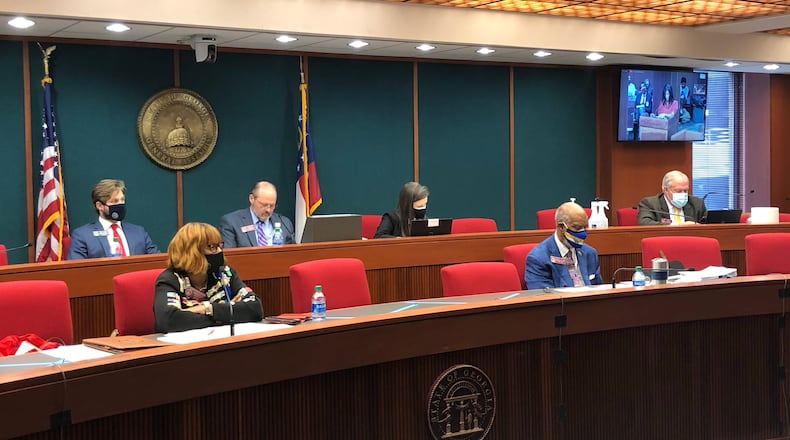Leading Georgia lawmakers said Thursday that they plan to maintain Sunday voting and no-excuse absentee voting but pursue strict controls on other areas of voter access and ballot counting.
Voting rights advocates continued to oppose the legislation during a three-hour hearing, saying it would still create obstacles by limiting drop boxes, setting earlier absentee ballot request deadlines and requiring more ID to vote absentee.
A committee vote on the expansive legislation, Senate Bill 202, could come as soon as Monday, setting up final decisions on changes to Georgia’s voting laws within days.
State Rep. Barry Fleming, the chairman of the Special Committee on Election Integrity, proposed allowing early voting on as many as four weekend days leading up to an election, including two mandatory Saturdays statewide. That would be an expansion of early voting, where counties now must offer one Saturday and have the option of providing voting on three other weekend days.
A previous bill would have limited early voting to one optional Sunday, a proposal that threatened “Souls to the Polls” group voting events organized by Black churches.
Fleming also said he doesn’t intend to move forward with a bill passed by the state Senate that would have limited absentee voting to those who are at least 65 years old, have a physical disability or are out of town. Senate Majority Leader Mike Dugan has also said he doesn’t expect an elimination of no-excuse absentee voting to become law.
Fleming said he wants to improve voter confidence by ensuring that absentee ballots are legitimate and by encouraging the use of in-person ballots, which are typically counted more quickly. The bill would seek more immediate election results by requiring county election workers to continue counting ballots until they’re finished.
“Your momma taught you when you were young, not a lot of good things happen after midnight,” said Fleming, a Republican from Harlem. “It adds to suspicion when in the wee hours of the morning, you’re still counting.”
Election rules in Georgia would be tightened in many other ways, according to the bill.
Most provisional ballots cast outside a voter’s home precinct would be disqualified, voting groups wouldn’t be allowed to send absentee ballot request forms to voters who have already applied for a ballot, and the State Election Board could take over underperforming county election offices.
Aunna Dennis, executive director of Common Cause Georgia, said out-of-precinct voters would be disenfranchised if their provisional ballots are discarded. Under current law, federal and state races for voters who show up in the wrong county precinct are counted, but they can’t vote for local contests they’re not eligible to participate in.
“This bill cuts at every part of the voting process in Georgia and is making it very difficult for the most vulnerable populations in Georgia to be able to cast a ballot,” Dennis said.
Other voters who testified Thursday, many of whom identified themselves as Republicans who want changes after November’s election, said they support the legislation.
“These bills are not about voter suppression. They’re about restoring fitness, faith and trust in elections,” said Marci McCarthy of the DeKalb County Republican Party.
Under the legislation, absentee voters would need to submit a driver’s license number, state ID number or other documentation. The new ID process would replace the state’s existing process of verifying absentee ballots by comparing voters’ signatures.
In addition, absentee ballot drop boxes would be limited. The bill would require them to be located inside early voting locations and only available during early voting, which ends the Friday before election day.
“This bill renders them useless,” Heard County Election Supervisor Tonie Adams said. “The post office process was also a problem.”
The measure under consideration in the House is one of two omnibus voting bills pending in the Georgia General Assembly. The state Senate plans to take up similar changes to Georgia elections on Monday.
To become law, the bills must win final votes in the state House and Senate before this year’s legislative session ends March 31.
About Senate Bill 202
Key provisions of the proposed election legislation would:
- Require more absentee voter ID
- Limit absentee ballot drop boxes
- Set a deadline to request absentee ballots 11 days before election day
- Disqualify provisional ballots cast in the wrong county precinct
- Prohibit the distribution of food to voters waiting in line
- Restrict absentee ballot application mailings
- Authorize the State Election Board to take over underperforming county election offices
About the Author
Keep Reading
The Latest
Featured




